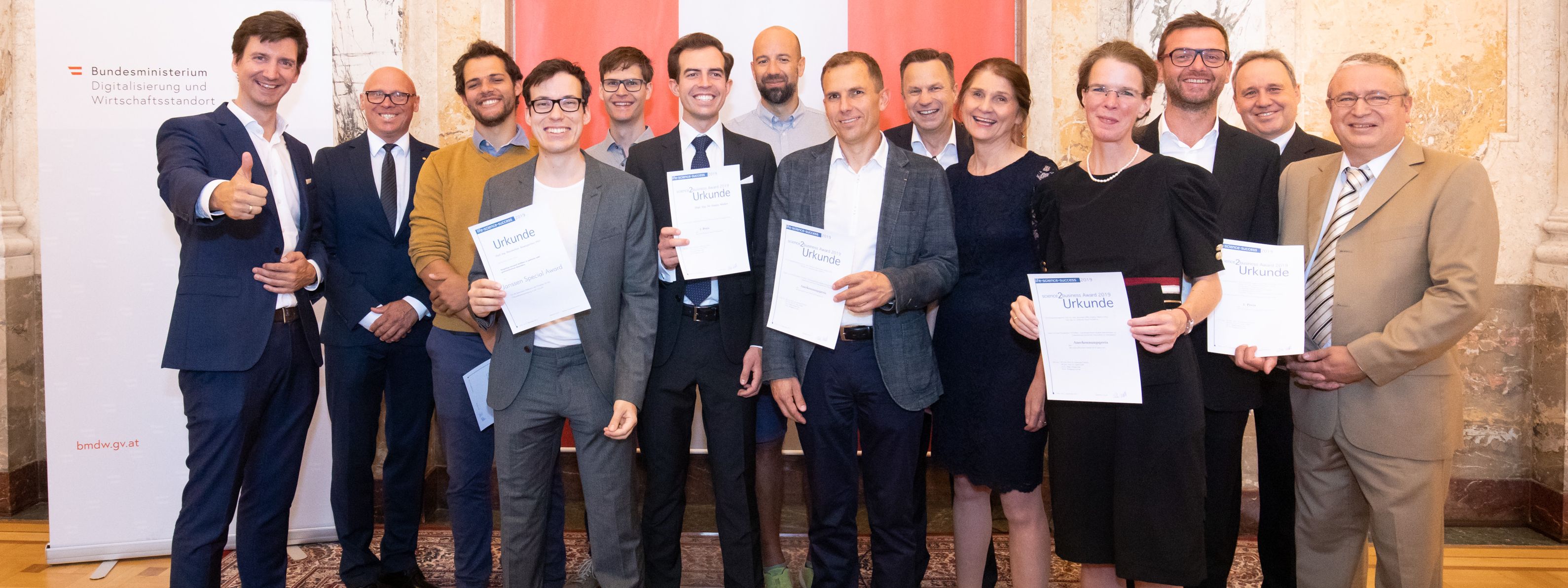
(Vienna, 09 September 2019) Awards for MedUni Vienna experts at life-science-success 2019 at the Federal Ministry for Digitization and Business Location: Henriette Löffler-Stastka and Cosima Prahm won the science2business Award and Maximilian Baumgartner won the Janssen Special Award. Life-science-success is an annual conference to promote networking between business and science.
Henriette Löffler-Stastka, psychiatrist and psychoanalyst at MedUni Vienna heads up the project "SOLAfem - interventions to promote mental health in the workplace".
Specific working and organisational models are necessary to maintain and foster mental health in the workplace. These models are very dependent upon differences in personality, gender aspects and factors relating to socialisation and temperament.
Various digital platforms with integrated smart systems are able to promote mental health in the workplace but, so far, there are hardly any digital solutions that are based on scientifically founded models. Moreover, it is not yet known how different genders can benefit from digital systems for promoting health in the workplace.
The aim of this project is to investigate how a smart digital system for promoting mental health in the workplace (digital intervention) needs to be designed so that it can specifically address gender differences. To this end, the researchers are studying various work-related psychosocial factors and personality models, which can then be tested by surveys run at MedUni Vienna and other large companies.
The project was chosen because of the innovative combination of digitisation and psychosocial approaches, as well as the huge significance of mental health in the workplace.
Cosima Prahm, research assistant at the Christian Doppler Laboratory for Restoration of Extremity Function at the Department of Surgery of MedUni Vienna won the award for the PlayBionic project. PlayBionic is an innovative and future-oriented project concerned with virtual rehabilitation and diagnostics for people who have had arm amputations. The combination of bionic reconstruction, robotic hands and virtual environments provides patients with modern, medically validated, evidence-based treatment. PlayBionic consists of several scientific studies, the results of which were used to develop various clinical applications, such as e.g. the interactive, game-based application "Myo2Beatz", which uses playful biofeedback to specifically train the muscles that are required for controlling a prosthesis correctly. Or a program to depict the phantom arm and phantom pain, which maps the body by means of a 3D avatar of the patient, thereby allowing the therapist to see a non-existent part of the body. Other applications include the digitisation of standardised hand function tests and the development of mathematical algorithms to improve prosthetic control.
science2business Award
The science2business Award is given for the best research collaborations between science and industry. The assessment focusses on the quality of implementation. The winners therefore stand out not only for their scientific abilities but also for their professional management. They demonstrate that they have experience of what is needed to ensure the smooth running of a joint initiative with industry and that they know how to utilise scientific findings commercially. The science2business Award is run by life-science Career Services within the context of life-science-sucess. The prize is funded and supplied by the Federal Ministry for Digitization and Business Location.
Maximilian Baumgartner, PhD student at MedUni Vienna's Division of Gastroenterology and Hepatology (Department of Medicine III), received the Janssen Special Award for the project “Targeting mucosal biofilms in patients with gastrointestinal disorders”.
The group led by Christoph Gasche was the first to describe bacterial biofilms that are visible under endoscopic examination in the gastrointestinal tract of IBS patients. This project will characterise these biofilms and analyse them in terms of relevance to disease. This involves finding faecal biomarkers and developing innovative therapeutic strategies to combat bacterial biofilms in the gut. This project brings together experts in gastroenterology, microbiology and drug development with the common aim of improving treatment strategies for Irritable Bowel Syndrome.
This project received the award because of its medical relevance in the light of increasing prevalence and its potential feasibility.
Janssen Special Award
The Janssen Special Award is given for projects with particular relevance for the healthcare of tomorrow. It is run by life-science Career Services within the context of life-science-success. The prize is funded and supplied by Janssen Austria.